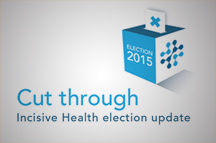Healthy number of sound bites, unhealthily little policy detail
 With a section dedicated exclusively to health policy, last Thursday’s leaders’ debate cemented health’s status as a central issue of the election campaign. The seven party leaders were offered the opportunity to set out their NHS stall and spell out how they would ensure long-term funding of the NHS while keeping it as a public service.
With a section dedicated exclusively to health policy, last Thursday’s leaders’ debate cemented health’s status as a central issue of the election campaign. The seven party leaders were offered the opportunity to set out their NHS stall and spell out how they would ensure long-term funding of the NHS while keeping it as a public service.
The invitation to offer specific answers to what will be the key health policy question for years to come was politely declined by the leaders. Instead, each retreated to the safety of their respective comfort zones. Ed Miliband and others on the left warned of the overwhelming tide of NHS 'privatisation' and Nigel Farage enjoyed a good old moan about the number of foreigners using the NHS.
David Cameron meanwhile proudly cited the number of NHS 'bureaucrats' cut under his watch as proof of sound financial management. Quite what Terry, the retired NHS manager who posed the question, took from the Prime Minister’s response remains to be seen.
The discussion then descended into a tit-for-tat exchange of focus-grouped and well-polished sound bites; with top lines that each party believe will resonate best with the voting public but have little to do with the reality of health policy. Inevitably, this stampede towards ‘retail politics’ will dominate health debates over the next month. In an era when politicians have to compete hard for voters’ attention and messages need to fit into 140 characters, policies need to be over-simplified and consistently repeated in order to stick.
In health, this approach is starker than in other areas. As health policy experts ponder the deep, complex and growing challenges facing the NHS, our potential leaders scramble to avoid any detailed discussion of the key issues and policies at all.
As a case in point, GPs are once again taking a starring role in this campaign. David Cameron used the debate to outline his party’s well-rehearsed promise of seven-day access to GPs, while Labour have spent the past six months reiterating their plan to use a mansion tax to fund 8,000 new GPs. These are attention-grabbing ideas, and chime with the general expectation of parties finding a simple, positive offer for the NHS that impacts on the lives of ‘ordinary’ voters.
But, neither of the main parties are explaining how they would address the reality of the chronic shortage of GPs. This, in a week in which research has shown that one in three GP training posts are vacant and more than 500 practices are under threat of closure because so many doctors are close to retirement, may be frustrating – but politics is politics.
Will next week’s expected manifesto launches see a deluge of detail on party plans for the NHS? Don’t hold your breath.













